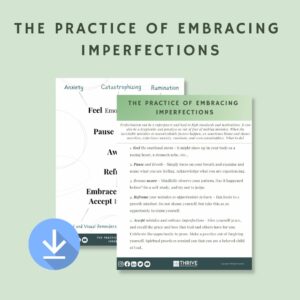Thrive Center’s Jilleen Westbrook in Conversation with Dr. Kenneth Wang
I sat down with Dr. Kenneth Wang to discuss the topic of perfectionism. He, with his Imperfect Culture Lab, looks at “how perfectionism affects individuals and families across various cultures.” Given that we live in such a performance-oriented culture and that social media elevates pressure for a picture-perfect life, I was particularly interested to know why so many people feel trapped in perfectionism and whether this tendency could be directed for the good of the individual and the world. According to a study reported in the Harvard Business Review this tendency has increased significantly in the past few decades among young people, with around 60% of college students either adaptive or maladaptive perfectionists. Within religious communities, people’s views regarding God are associated with their own personal perfectionism, and perfectionism can be particularly difficult for some “believers who rigidly adhere to religious rules without any flexibility” (Ellis, 1986). Here’s what Dr. Wang shared with me.
Why are people perfectionists?
There are multiple reasons. On the research front – part of it is nature, part of it is nurture. Research has found that twins are more likely to have similar tendencies toward perfectionism, suggesting that something about perfectionism can be inherited. Nurture, or influences outside of our biology, occurs in different ways. People model their parents. If their parents are perfectionists, they tend to be more perfectionistic. This effect can be even greater if perfectionism was emphasized and linked to how love was obtained. Conditional love can teach children to continue to seek perfection, even into adulthood, as a way to justify love and care from others.
How does perfectionism affect how people live?
Perfectionism has different domains. There are people who are simply perfectionists in general. They strive for perfectionism in most aspects of life. There also are people who might be perfectionistic in certain aspects of their lives. For example, if someone’s very perfectionistic around order – it might look like OCD. And if someone’s a perfectionist in relationships – it might come out as social anxiety. If someone’s a perfectionist in their body image and in their eating – it might come out as an eating disorder. Some people who are religious suffer from religious perfectionism. They want to be perfect believers and to feel approved of by God.
Is perfectionism necessarily a bad thing?
Perfectionism has two sides. Perfectionism can become a burden to our mental health, relationships, and our physical well-being. However, research suggests that there are positive aspects. If the definition of perfectionism is that you strive for perfection, that means you have very high standards. You do your best to achieve those standards. Striving towards goals and applying oneself are positive in themselves. In this sense perfectionistic tendencies are associated with achievement and self-esteem. A negative aspect of perfectionism is when you are bothered with any imperfection. In addition, the self-criticism, never feeling good enough or magnifying mistakes, is the part of perfectionism that is troublesome. That’s the part that’s related to depression and anxiety. Many people believe their perfectionism is their superpower. Perfectionism can motivate people towards excellence, but it becomes harmful when anxiety and rumination impact people’s stress levels. In a performance-oriented society, it’s especially important to be aware of potential negative effects on mental health. When it comes to perfectionism, the old adage might be true—our greatest strength is our greatest weakness.
Short of therapy, are there things people can do to work on their perfectionism
For those who tend to strive for perfection but want to work on themselves, or want to let go of the striving to be perfect or the pressure to perform, I want to tell them that you can continue to have high standards, but it’s about having mental flexibility when you don’t get there.
Catch yourself. When you’re focusing on imperfections, and you’re magnifying them and you’re being super critical: pause. If you have a strong inner critic that tells you you’re not good enough: pause. If you worry that if you don’t do something, a catastrophe will happen: pause. If you worry that if you fail to accomplish something, you won’t be loved: pause.
Pausing helps us become more aware. Since perfectionists tend to be afraid of failure, try to be aware of and address this fear. Perfectionists are afraid of mistakes. And they try to avoid mistakes at all costs. If I use a sports analogy, it’s like they put all their focus on defense, and they avoid the risk of trying to score points.
A better way to think about becoming a more perfect person from a holistic view is to become better at coping with mistakes. You can’t avoid all mistakes. If you never make a mistake again, you’ll never grow or improve. You won’t develop the mental muscles to deal with future mistakes. The next time you encounter a failure, reframe it as, “Okay, this is a mental workout. This is a time where I get to practice in terms of how to cope with mistakes.”
It’s not about avoiding mistakes but about being able to accept, being able to deal with mistakes and recognize that you are on a journey or a work in progress. Living into an attitude of change and growth is related to a growth mindset, based on Carol Dweck’s theory. Journaling or talking with a trusted friend and getting feedback might be useful to develop more of a growth mindset.
Perfectionism can hurt your well-being, but it can do some good things for you too. Striving can move us forward. People become doctors. People become researchers and lawyers – professions where perfectionism is an asset. (Most people prefer that their surgeons do their work perfectly!) Often perfectionism pushes us toward what is beautiful and good, but it can also cause stress and difficulty. If we can reframe perfectionism into a growth mindset, well, that’s the idea. It’s an actual practice. Each day, embrace mistakes, and use them as opportunities for mental workout sessions. Ask yourself, “Okay, how am I going to cope with this?” The struggle of feeling like, “This is so uncomfortable, but I know that this is like a workout session; that if I do more of this, I’m going to be more comfortable with it.”
Can working on regulating our emotions help us manage perfectionism?
It’s the emotions that cause us stress. And oftentimes when we are really stressed, we catastrophize. Mistakes feel like the end of the world. So, pausing and realizing that, “I’m in an emotional storm. I feel like my world is falling apart, but actually it’s just my feelings. It’s not reality.” We have to accept our feelings and in order to diffuse them. So, breath, take a step back and observe, and then say, “Okay, I’m feeling super anxious now,” but I am aware that based on my pattern, this is an emotional storm. I can ride it out. I’m thinking with my amygdala, so I’m not thinking rationally. And even though I can’t just flip a switch now, the emotional storm will go away eventually, and then after a few days I’ll be like, “Oh, that was so silly.” “Yeah. I was so bothered by this.” It wasn’t as awful as I thought it was, but the cloud of my emotions exacerbated the catastrophic predictions.
In the moment, we think we can predict the future, and we predict our failure. Plus, we predict any and all potential catastrophes. When we experience ourselves catastrophizing and having these overwhelming experiences, an effective anecdote is to take a step back and realize, “Okay, I’m doing this again. Yeah. I’m predicting failure.” Pause, and imagine riding out the emotions knowing they will pass through like a storm. And ask, what’s my track record? The last time I predicted catastrophe, did I fail? Check the facts; do a little self-study.
Mindfulness helps us recognize how we think and feel. Being mindful – observing what’s happening – I don’t need to judge, but rather just be, and observe the feeling and patterns and accept where I am now. Observing our patterns is part of developing mental flexibility.
Once you are aware of how perfectionism shows up in your life, you might want to work on this tendency. However, it’s important to note that many perfectionists are afraid to let go of their perfectionism. I’ve had a lot of perfectionistic clients. I ask them, “Imagine if I gave you this pill, and if you took it, you wouldn’t be perfectionistic anymore. Would you take it?” Most of them tell me they would not. They’re afraid because they feel like perfectionism is their fuel or their drive in life. They might lose the thing that makes them special and excel. However, sometimes this “superpower” can get in the way of their well-being and their relationships.
Do you have personal practices that you are willing to share?
I keep notes on my phone called “My life is messy list.” My goal is to accept the messiness of life, the imperfections of life – whether it’s me or the environment. When I’m having a stressful moment, I write it down on my list. Every once in a while I look at my list. I realize that the things I was worrying about took care of themselves, even if at the time they felt like a big disaster. I’ve been reading Henry Nouwen, Life of the Beloved. It talks about responding to fear by “embracing our identity as a beloved child of God.” We focus too much on what we do, and how we’re perceived by others. I find remembering who I am to be the most powerful way to reframe perfectionism. I am a beloved child of God.
Another practical way for me to cope with perfectionism is utilizing cognitive and visual reminders. An example of a cognitive reminder is to know and remind myself that perfectionism is one of my Saboteurs. When I am distressed, I remind myself to tone down my inner critic. I also use visual reminders like having imperfect decorations (e.g. kintsugi bowl, imperfect images) strategically placed in my office and home to help me tolerate, accept, and embrace imperfection.
Remember that it takes practice to manage the rumination and fears associated with perfectionism. We compare ourselves, perhaps worry about being loved, and we often struggle with thoughts that the worst will happen if we make a mistake. The practice of pausing, mindfully observing our critical thoughts, and reframing them is just that, a practice. After all, we don’t want to become perfectionistic about fixing our perfectionism!
For deeper reading on this topic:
Almost Perfect Scales website for those interested in perfectionism related research tools.
Ellis A. (1986). Do some religious beliefs help create emotional disturbance? Psychotherapy in Private Practice, 4, 101–106. https://doi.org/10.1017/s0924270800030660
Jun, H., Wang, K. T., Suh, H. N., & Yeung, J. G. (2022). Family profiles of maladaptive perfectionists among Asian international students. The Counseling Psychologist. Advance online publication. https://doi.org/10.1177/00110000221089643
Rice, K. G., & Ashby, J. S. (2007). An efficient method for classifying perfectionists. Journal of Counseling Psychology, 54, 72–85. https://doi.org/10.1037/0022-0167.54.1.72
Wang, K. T., Allen, G. E. K., Stokes, H., & Suh, H. N. (2018). Perceived Perfectionism from God Scale: Development and initial evidence. Journal of Religion & Health, 57, 2207-2223. https://doi.org/10.1007/s10943-017-0405-1
Wang, K. T. (2010). The Family Almost Perfect Scale: Development, psychometric properties, and comparing Asian and European Americans. Asian American Journal of Psychology, 1, 186-199. https://doi.org/10.1037/a0020732
Wang, K. T., Xie, Z. Y., Parsely, A. C., & Johnson, A. M. (2020). Religious Perfectionism Scale among believers of multiple faiths in China: Development and psychometric analysis. Journal of Religion & Health, 59, 318–333. https://doi.org/10.1007/s10943-019-00784-z
Wang, K. T., Kang, M. S., Lee, H. C., & Sipan, I. (2021). The Religious Perfectionism Scale: A cross-cultural psychometric evaluation among Christians in the United States, Journal of Psychology and Theology, 51, 251-262. https://doi.org/10.1177/00916471211011595
Continue Exploring

Emotions
A Practice in Emotional Regulation: Tending to our Inner Selves
Practice attention and emotion regulation using the following.

Blog
Does your sense-of-self and narrative support healthy spirituality?
What is the story you tell yourself about your life? Does it help you or keep you from thriving?

Emotions
A Practice: Embracing Self-Compassion During Times of Grief
Guest blogger, Stephanie Trudeau talks collective loss and how we can approach our feelings with compassion and grace.


